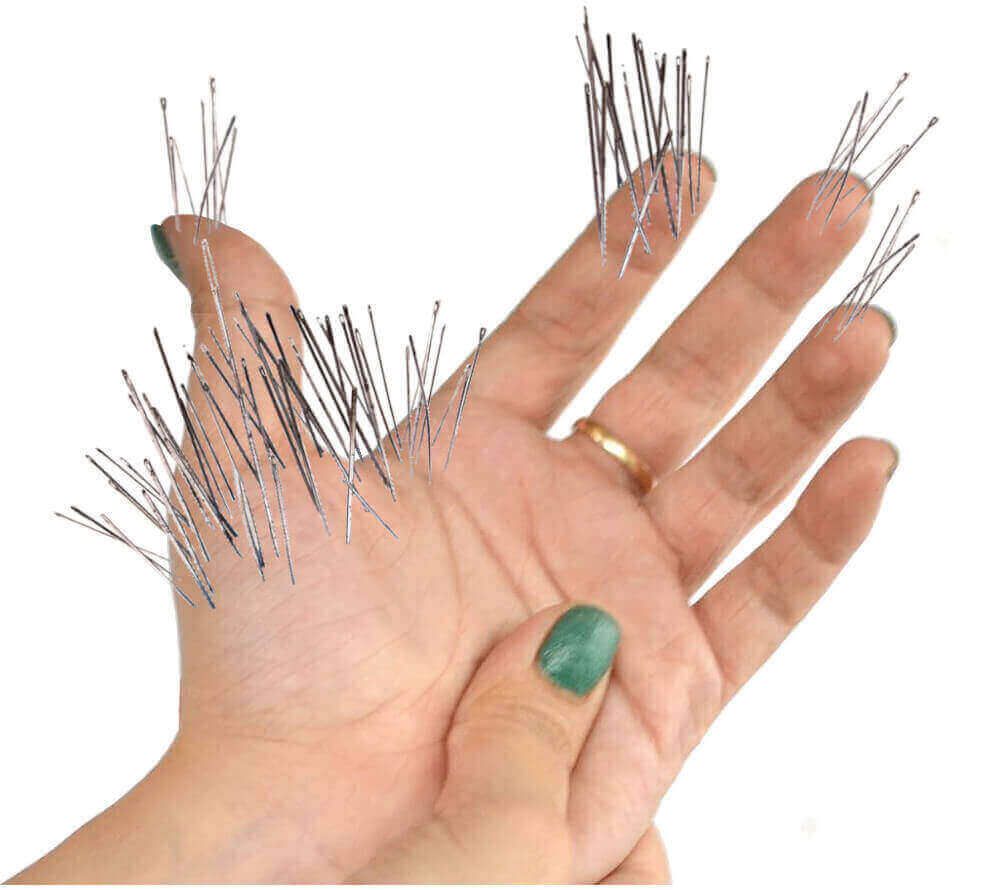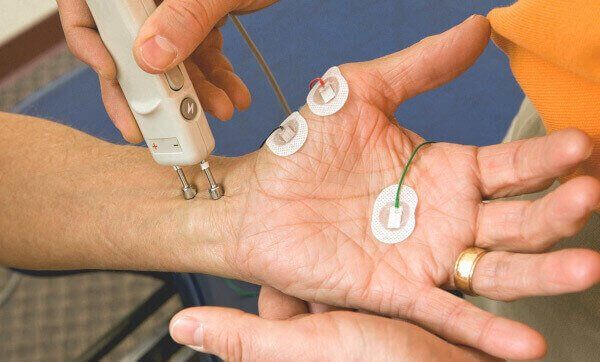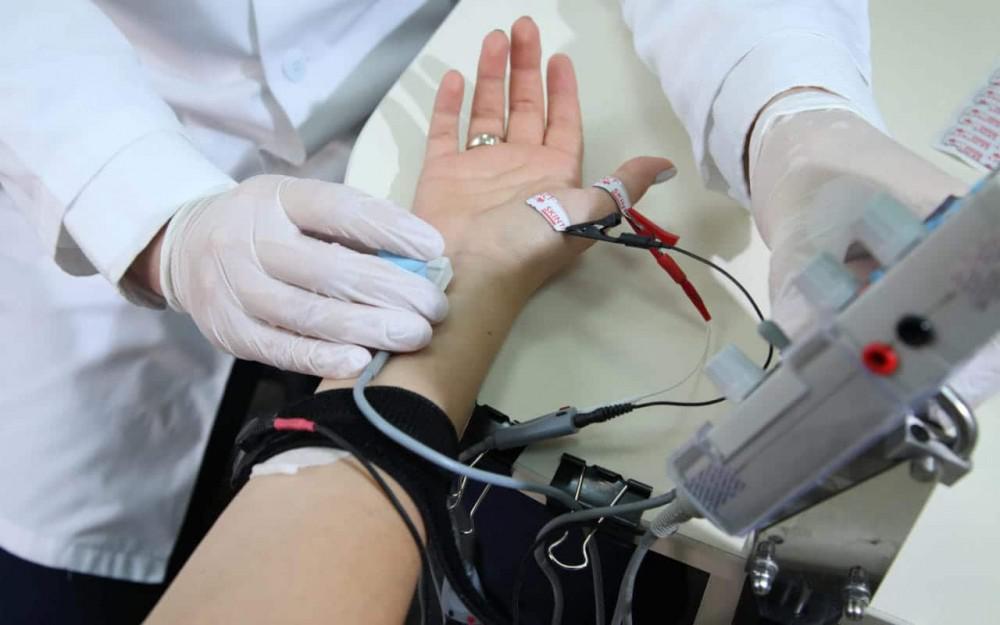How Doctors Test for Carpal Tunnel Syndrome
Table of Contents
- Overview
- What causes carpal tunnel syndrome?
- Carpal tunnel symptoms
- 2 types of test for carpal tunnel syndrome
- Electrodiagnostic test for carpal tunnel syndrome
- Nerve Conduction Tests
- EMG test
- Provocative tests for carpal tunnel syndrome
- Nonsurgical treatments for carpal tunnel syndrome
- Avoidance & rest
- Night bracing
- Stretching exercises
- Myofascial release massage
- Summary
- FAQs
- About
Overview
Your doctor may order a test for carpal tunnel syndrome to help diagnose your disorder. If so, you probably have
symptoms like pain in your hand or fingers. Maybe your fingers go numb or tingle when you're trying to sleep or when you're holding something like a phone.
The doctor will order specific tests if they suspect you have carpal tunnel syndrome. And if you have these symptoms, you have a lot of company. This disorder is very prevalent in the USA. Over 4 million Americans already have carpal tunnel syndrome.
A positive test for carpal tunnel syndrome will result in a few treatment options to eliminate the symptoms for good. The doctor will describe these options after reviewing your test results.
This article describes what happens with each test for carpal tunnel syndrome.
What causes carpal tunnel syndrome?
Before learning how to test for carpal tunnel syndrome, you should understand what this disorder is
all about. In reality, the condition (some just call it "carpal tunnel” for short)
is a type of injury.
Your likelihood of suffering from this injury is
genetic.
If a close family member has or had carpal tunnel, then you're prone to getting it, too. And if you're prone to getting it, certain things (risk factors) can make carpal tunnel blossom into pain and numbness..
In that regard, it's like how diabetes happens. If you're prone to diabetes, then it's already in your genes. If you become overweight and smoke, then the diabetes will show itself. Others who don't have it in their genes can be obese and smoke but never see the disease.
Likewise, if you're prone to carpal tunnel then over-working or
repetitively stressing your hands will make itself known. Therefore, over-using your hands or making rapid and forceful movements for a long time causes the carpal tunnel to appear.
This can happen by stressing your hands
typing, gardening, fishing,
hairdressing,
knitting,
gaming, golfing or
playing guitar, for example. It can happen wherever you engage in repetitive and forceful movements of your hand and fingers.
In short, carpal tunnel isn't
caused by anything. You either have it in your genes or you don't.
But if you have it AND perform certain activities, its symptoms will probably arise.
Carpal tunnel symptoms
This disorder has very specific symptoms your doctor can diagnose in a test for carpal tunnel syndrome. The symptoms include hand or finger:
When it starts out, symptoms (usually pain or numbness) wake you up at night. You feel the need to "rub out" pain or "shake out" numbness.
Some of the first signs of carpal tunnel is noticing that it's difficult or feels clumsy to pick up small objects like a coin, pencil or keys. Maybe it's hard to tie a shoelace or button a shirt. You might be dropping silverware, cups or glasses. Many people have difficulty just opening a jar.
The condition is more advanced if you’ve lost sensations of hot and cold in your fingers. It's also more advanced if symptoms are bothersome all day AND night. (Essentially there's no getting away from it.) This is classified as
severe carpal tunnel syndrome.
About 80% of the time, symptoms happen in both hands within 6 months. This is called
bilateral carpal tunnel syndrome.
2 types of tests for carpal tunnel syndrome
A test for carpal tunnel syndrome is something a doctor can do in his or her office. Actually, the doctor may opt to perform 2 kinds of tests:
- Electrodiagnostic tests
- Provocative tests
Electrodiagnostic tests are divided into two types:
nerve conduction and electromyography or EMG. Today, doctors are not performing these tests a lot because of their variable results. They produce a great deal of false positive results, making them unreliable. That means they indicate you have carpal tunnel when it's actually not present.
Then you may be wrongly recommended for surgery.
Instead, more and more doctors are relying heavily on
provocative tests. Doctors simply try to "provoke" symptoms using certain techniques described below. When performed on a routine basis, these provocative tests are highly reliable.
In fact, you can
perform these identical provocative tests for carpal tunnel syndrome on yourself and at home.
See how to do them here.
The current trend for doctors is to use both tests to confirm each other.
Electrodiagnostic tests for carpal tunnel syndrome
An electrodiagnostic test includes nerve conduction and electromyography or EMG. Basically, these are tests for nerve damage.
Nerve Conduction Tests
Nerve conduction tests assess how well the
median nerve sends electrical signals along its length and into the hand. (The median nerve is what's damaged in carpal tunnel syndrome.) If the electrical signal slows down, that means the median nerve is blocked by damaging conditions inside the wrist joint.
To perform a nerve conduction test, the doctor tapes electrodes to your skin around your thumb. Then the doctor places an electrical simulator at various points on your forearm's skin. As the simulator fires signals, the electrodes on your thumb pick up the signal's speed down your median nerve. The procedure is uncomfortable, but doesn't last long. A slow-down in nerve conduction speed usually indicates carpal tunnel syndrome.
EMG Test
The EMG test is a bit more painful. That's because the doctor inserts a thin needle into the muscles of your hand. As the particular muscle being examined moves, the needle tells the instrument if the muscle's electrical activity is normal. If it's not, it could mean that the signal to that muscle is interfered with (in the wrist joint) due to carpal tunnel syndrome.
A big problem with these tests is that they give the doctor too many
false positive results, especially in patients with less severe symptoms. This is probably largely due to "operator error". But the outcome is that they cannot be solely relied upon for a diagnostic.
Because of this, the
National Instituters of Health advises that electrodiagnostic tests should only be used to "confirm" the provocative tests for carpal tunnel syndrome (see next section).
Provocative tests for carpal tunnel syndrome
As discussed, the nerve conduction and EMG tests for carpal tunnel syndrome have fallen out of favor due to their unreliability. However, the simple "provocative" tests (actually, they're multiple exams) are reliable, painless, and inexpensive.
Your doctor will perform these simple provocative tests to confirm if you have carpal tunnel. These include the Phalen, Tinel, and Durkan tests (see pictures above). You can do these tests at home as well, and with high reliability.
Click here to learn how.
Essentially, the provocative tests for carpal tunnel syndrome re-create or "mimic" your symptoms. The doctor bends, squeezes or taps your wrist and hand. If these can reproduce the symptoms, then you have confirmed carpal tunnel syndrome.
These tests are highly reliable and accurate. That's especially the case when the examiner has a lot of experience with such testing. Moreover, they cause no pain, are quick, and cost nothing.
Nonsurgical treatments for carpal tunnel syndrome
Once you have a positive test for carpal tunnel syndrome, the doctor may encourage you to have carpal tunnel surgery. But surgery isn't as successful as most would have you believe.
Consider that fact that
50% of patients are dissatisfied with their results two years later. That's because either 1) their symptoms never went away, 2) pain returned or 3) pain & numbness got worse.
As more advanced
non-surgical options became easily available, the
American Academy of Orthopedic Surgeons recommends trying them first, before considering surgery. These recommended non-surgical treatments include:
- Avoidance & rest
- Night bracing
- Stretching exercises
- Myofascial release massage
Avoidance & rest
Night bracing
Stretching exercises
Myofascial release massage
Summary
A test for carpal tunnel syndrome can determine if you have this painful condition. If it's positive you should begin treatment immediately because chances are good the condition will only worsen.
FAQs
Do the electrodiagnostic tests hurt?
The EMG test requires needles inserted into your muscles. This is considered somewhat painful by most patients.
My doctor only did an EMG and then recommended carpal tunnel surgery. Is this normal?
The AAOS recommends having positive results from both EMG and provocative testing before recommending surgery.
If surgery works only 50% of the time, why take the chance to do it?
If you tried all nonsurgical options but failed to relieve symptoms, then surgery (however risky) may be your last option.
About














